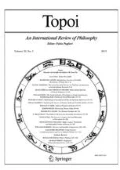Abstract
For Plato, the crucial function of human cognition is to grasp truths. Explaining how we are able to do this is fundamental to understanding our cognitive powers. Plato addresses this topic from several different angles. In the Cratylus and Theaetetus, he attempts to identify the elemental cognitions that are the foundations of language and knowledge. He considers several candidates for this role, most notably, perception and simple meaning-bearing concepts. In the first section, we will look at Plato’s worries about semantic instability and its epistemic consequences. The central role of basic cognitions in Plato’s account of knowledge in the Theaetetus will be explored in the second section. In the final section, the relevance of Plato’s conception of cognition to modern discussions in the philosophy of language and epistemology will be noted.
Similar content being viewed by others
Notes
Republic VI 509d–513e, VII 522e–533d; cf. Phaedo 74d–e, Symposium 211a–212a.
More precisely Socrates is looking for a definition of epistêmê. The conception of epistêmê explored in the Theaetetus corresponds to knowledge broadly conceived (Tht. 145e). Throughout I will use ‘knowledge’ for knowledge in the broad sense.
Cf. Aristotle, Metaphysics 987a32–b7. See also Modrak (1981).
While we might be comfortable using ‘this’ for denotation only, Socrates believes that even ‘this’ or ‘that’ indicate a stable nature (Tht. 156b) and so he rejects these terms and also ‘thus’ and ‘not thus’ because they, too, indicate fixity (183b).
Here I follow the received text. It has become popular in recent translations of the Cratylus to follow Schofield (1972) and move 385b2–d1 and insert it between 387c5 and c6. I believe that it is possible to attribute an interesting and cogent argument to Plato without re-arranging the text.
However, a coherence theory of truth would have to meet the challenges raised by Plato in the Theaetetus to Protagoreanism.
This motivation is particularly evident in the early Socratic dialogues, where definition after definition is rejected on the basis of the failure of the definition to hold of all and only the appropriate objects. It is also evident in the Sophist (see Modrak 2001, Chap. 3).
Cf. Sophist 263d–264b.
There is wide agreement among Ancient Greek philosophers that infants are not yet rational; cf. Tht. 197e–198a. Language is a pre-condition for rationality.
See Modrak (1981).
Cf. Rep. VII 524c–525a.
Cf. Phaedo 74a–75a; Rep. 529b–530b.
Epicurus appears to have bitten this particular bullet and consequently he argues that all perceptions are true (D.L. 10.31–2) but Plato would not have found this solution congenial.
Cf. Philebus 39a. See also Lewis (1973).
Harte (2002) begins her comprehensive study of Plato’s conception of composition with Theaetetus 203–206 (pp. 32–47).
Cf. Fine (1979) that attributes an “interrelation model of knowledge” to Plato.
Cf. Socrates’ view in the Cratylus that in order for a word to have a meaning, its elements must also be meaningful.
Gorgias famously argued that we could not know what is real but even if we could we would not be able to communicate it (S.E. 7.65–86).
Whether thought is prior to language or language to thought, the challenge remains to identify the basic cognitions that can serve as the building-blocks for knowledge more generally.
We might hope to avoid the limitations of a natural language by adopting a formal language. Plato admires mathematics for this reason; its representations are not affected by the vagaries of sense experience; however, he considers philosophy not mathematics to be the pre-eminent form of knowledge (Rep. 533b–534a). Philosophical concepts have their roots in natural language.
References
Fine G (1979) Knowledge and logos in the Theaetetus. Philos Rev 88:366–397
Harte V (2002) Plato on parts and wholes: the metaphysics of structure. Clarendon Press, Oxford
Lewis F (1973) Foul Play in Plato’s aviary: Theaetetus 195 B ff. In: Lee E, Mourelatos A, Rorty R (eds) Exegesis and argument, phronesis supplemental vol 1, Chapter 13, (Phronesis Suppl Vol). Van Gorcum, Assen
Modrak D (1981) Perception and judgment in the Theaetetus. Phronesis 26:35–54
Modrak D (2001) Aristotle’s theory of language and meaning. Cambridge University Press, Cambridge
Schofield M (1972) A displacement in the text of the cratylus. Class Q 22:246–253
Author information
Authors and Affiliations
Corresponding author
Rights and permissions
About this article
Cite this article
Modrak, D.K.W. Meaning and Cognition in Plato’s Cratylus and Theaetetus . Topoi 31, 167–174 (2012). https://doi.org/10.1007/s11245-011-9116-5
Published:
Issue Date:
DOI: https://doi.org/10.1007/s11245-011-9116-5




